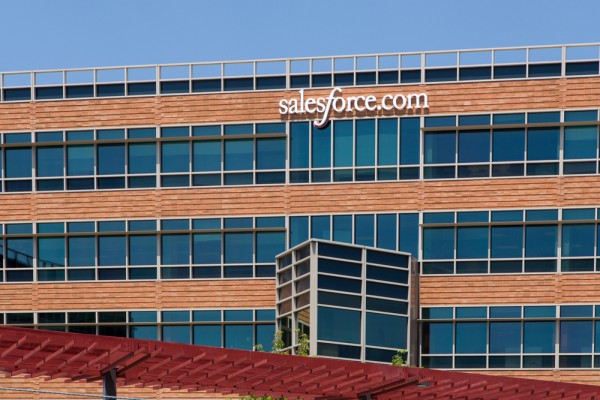Why Salesforce is no Microsoft competitor [Q&A]

Late last year Salesforce acquired Slack for $27.7 billion, a deal that has caused major waves within the enterprise software market as pundits try to forecast how the chat app fits under the Salesforce umbrella and whether this is an attempt to challenge Microsoft for the enterprise.
We spoke with CoreView CEO Shawn Lankton, whose company is not only a Microsoft Gold partner but whose SaaS management platform supports enterprises that operate cloud and hybrid environments. He gave us his thoughts on Salesforce's motivation behind the sale and how it will shape the enterprise software world.
BN: Why do you believe that Salesforce acquired Slack?
SL: There are two ways to interpret Salesforce's acquisition of Slack: either it's taking advantage of the market and buying a really cool SaaS app with a diehard customer base or it's trying to plug a hole within its platform.
Right now, Salesforce is a tech giant that has largely flown under the anti-trust radar. It's flush with cash and scooping up interesting enterprise tech companies like Slack, Tableau, and even Pardot a few years back. It's possible they're buying now and planning to figure out the rest later. Remember, Slack was purchased just slightly above their listed price so they didn't pay a huge premium on a company that was once white-hot.
It's just as likely that they knew they needed a chat function to improve the Salesforce platform. The company's current app, Chatter, was basically dead on arrival. Adding Slack's great enterprise UI/UX talent might help spice up an otherwise underwhelming Salesforce user experience. At the same time, Slack's powerful cross-company communications capability can connect buyers and sellers in powerful new ways. Imagine a simple double-opt-in to create a secure comms channel for discussing sales, customer service, or other sensitive conversations.
What we do know about this deal is that has Slack found the big brother it so desperately needed. The company tried to go toe-to-toe with Microsoft and was starting to see Teams eat its lunch. Financial backing, world-class go-to-market support, and large enterprise sales teams deliver an immediate boost to Slack while Salesforce gains a compelling product integration for the future.
BN: Do you agree with media reports that Salesforce is trying to compete directly with Microsoft?
SL: Every SaaS company competes with Microsoft to a certain degree. Microsoft is enormous and has its fingers in dozens of industries: from gaming to enterprise collaboration to social media and cloud. I don't think this is a direct shot at Microsoft; instead, this is Salesforce trying to improve upon what it already does at a higher level. Everything has changed, and everyone’s trying to better serve their customers in this new environment.
BN: Who do you think is Microsoft’s biggest competitor at the moment?
SL: All of the FAANG (Facebook, Apple, Amazon, Netflix, and Google) companies are competing against Microsoft to some extent. The most direct competitor is probably Google, with its head-to-head offerings of GSuite for productivity, Android/Chrome as an OS, a profitable cloud infrastructure business, and an AI assistant. It's done well with higher ed and startups because they are lower-cost alternatives to Microsoft but enterprises have stayed away mostly because of the risk involved. The risk isn't in the insecurity of Google's offerings; it's the worry that all of these non-core lines of business will suddenly go away if Google decides to stop funding these initiatives for any reason. At its core, Google is a digital marketing company that dabbles in everything else until it gets bored. Microsoft is an enterprise software company. Period.
BN: How has Microsoft been so successful in maintaining its leadership position?
SL: Microsoft has been executing a divide and conquer strategy with individual competitors. Any time a best-of-breed software vendor challenges one of its offerings -- including Slack, Canva, PipeDrive, AirTable, or Notion -- the company is able to re-allocate R&D resources and a global marketing engine to counter them. Throw in the fact of the company's backward compatibility and a light sprinkling of interoperability and Microsoft has cemented hundreds of life-long enterprise customers. It's really hard to leave Microsoft completely if you're operating a modern business.
China has some emerging offerings from WeChat, Baidu, and ByteDance but no one company has yet been able to really challenge Microsoft in the enterprise.
BN: How does Microsoft’s competitive advantage affect IT decisions?
SL: Just because Microsoft is the biggest, baddest enterprise productivity software company in the world doesn't mean it's the only game in town. I rarely see Microsoft-only shops. Salesforce is a great example of a company that has done well despite facing a well-entrenched Microsoft offering, Dynamics. The enterprise software market is not a zero-sum game. There's plenty of room for innovation based on the dynamic needs of businesses.
The fact is that we live in a multi-SaaS world where flexibility, agility, and transparency are critical for businesses. App creep is natural and healthy no matter how staunch of a Microsoft believer the CIO is at a company. Satellite SaaS deployments are inevitable. Businesses must have visibility into these deployments to keep them under management, though. Businesses must understand what apps employees are using so they can see, manage, and automate their hybrid and cloud environments.
Photo Credit: Ken Wolter / Shutterstock.com